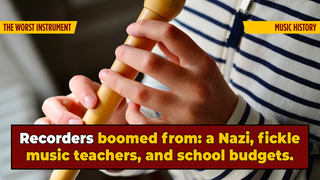You Learned the Recorder Due To School Cheapness

The recorder is a weird instrument.
It's about as old as written music, but it's not like there are professional recorder players ... Okay, that's not strictly true, but they don't admit it to new acquaintances.
It was integral to the renaissance and baroque sounds, but it was cast aside in favor of the transverse flute (that's the sideways boi), which could produce the volume necessary for a modern orchestra, and also because dudes started thinking it was "ungentlemanly to play an instrument that occupied the mouth." In other words, they thought it was gay.
That's why it's largely relegated to elementary school music rooms, but why even there? Mostly because of Carl Orff, most famous for writing Carmina Burana, the bane of high school choirs and movie trailer editors everywhere.
He was also a total Nazi, but that's mostly irrelevant except that his method was used to teach Hitler Youth, so have fun imagining those little shit screeching away on their music dicks. When he was developing his Orff Schulwerk method of arts education in the '20s -- because hey, everyone has a side hustle -- he landed on the recorder as the best instrument for teaching dumb babies how to play music. It's maybe the simplest instrument out there -- you don't have to learn any weird mouth movements or, like, the concept of chords -- and its small, lightweight design makes it easy to carry in your backpack. About 40 years later, American music teachers got super into the Orff Schulwerk method as well as baroque music, so they saw no reason not to drown in cheap flutes.
Oh, yeah, that was another thing that propelled the recorder's popularity in music education and nowhere else. The '60s brought major innovations in the manufacture of plastic, which lends itself to the recorder in a way that doesn't really work for other instruments. (Ever played a plastic tuba? There's a reason they call them "brass.") These days, you can get recorders in bulk for under a dollar each, so they probably paid you to take them in the '60s. That's why you know how to play "Mary Had a Little Lamb" on an instrument that fell out of favor in the Vivaldi era: a Nazi, the fickle tastes of music teachers, and the refusal of the American education system to plump up their budgets for 60 years.
Top image: congerdesign/Pixabay